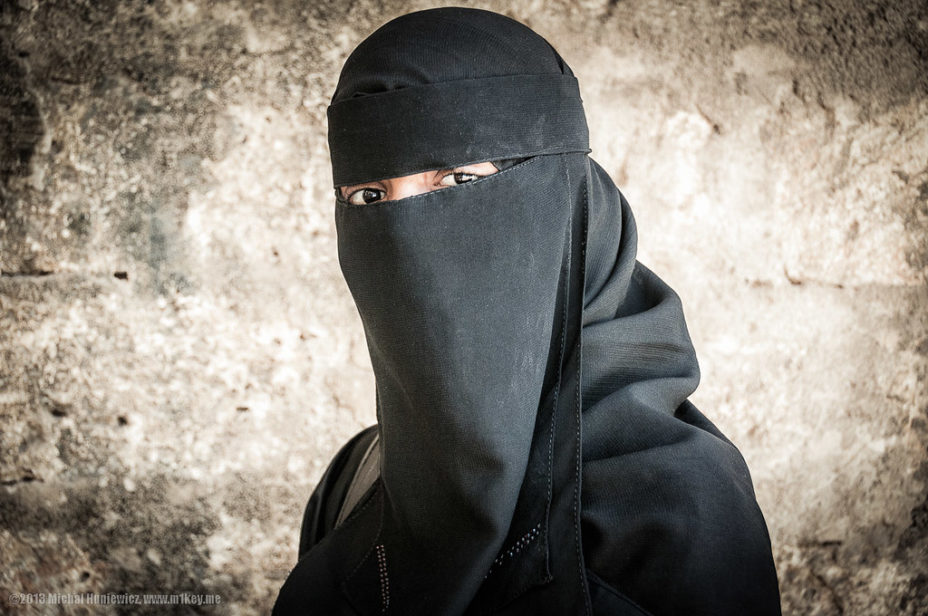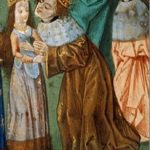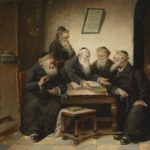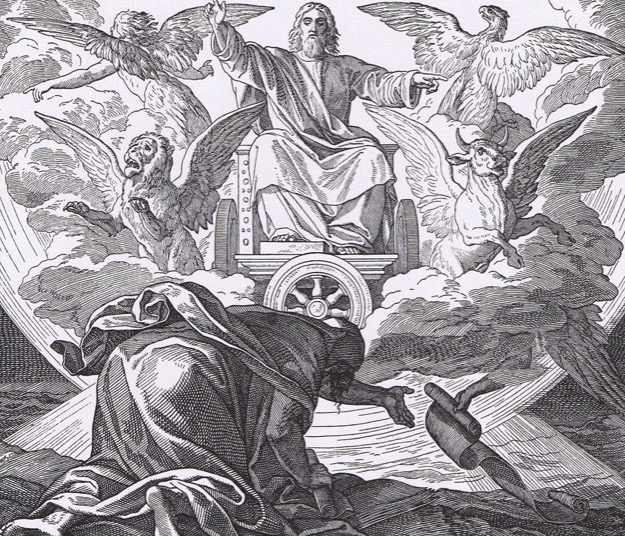| Name: | Zainab bint Muhammad |
| Clan/Origin: | Banu Hashim of Quraysh |
| Birth: | ca. 598 |
| Marriage: | bef. 610, Abu al-As ibn al-Rabi’ |
| Children: | Ali (b. btw. 616-620, d. ca. 330) Umama (b. ca. 622 d. ca. 670) |
| Status: | Companion and Family of Muhammad |
| Death: | mid-629 |
| Other: | Muhammad’s oldest daughter |
Zainab was the oldest of Muhammad’s daughters and the first born after his son al-Qasim. She was married to Abu al-As before Muhammad’s Inspiration. Unlike Muhammad’s middle daughters, she was not divorced and returned by her husband after 613, when Muhammad began preaching openly. Part of this would have been because she, unlike her sisters, was post-pubescent and the marriage had been consummated. (Her sisters were returned without a mahr, which means they were virgins at the time of their return.) Part was also that Muhammad’s main opposition in Mecca was his uncle Abu Lahab, who was the father-in-law of his other two daughters–he had the power to demand the divorce of his sons but not that of Abu al-As, who was not under his authority.
Islamic tradition holds that she was an early convert to Islam, but none of the traditions are very sure about when she converted–Muhammad’s daughters are left out of all the chronological lists of the “First to Accept Islam.”
Shia Muslims claim that all of the sisters except for Fatima were actually cousins, daughters of Khadija’s sister Hala. However, there’s no logical reason to believe this, and the story is doubly contradicted by the ahadith that refer to Hala outliving her sister, and it also means that Zainab would have been in an incestuous marriage with her own brother! The Shia sources have so thoroughly purged references to Muhammad’s other children that they don’t realize this.
Abu al-As was among the captives after the Battle of Badr. We read this in Ibn Ishaq:
Among the prisoners was Abu’l-‘As b. al-Rabi’, son-in-law of the apostle, married to his daughter Zaynab. Abu’l-‘As was one of the important men of Mecca in wealth, respect, and merchandise. His mother was Hala d. Khuwaylid, and Khadija was his aunt. Khadija had asked the apostle to find him a wife. Now the apostle never opposed her—this was before revelation came to him—and so he married him to his daughter. Khadija used to regard him as her son.
When God honoured His apostle with prophecy, Khadija and her daughters believed in him and testified that he had brought the truth and followed his religion, though Abu’l-‘As persisted in his polytheism.
Now the apostle had married Ruqayya or Umm Kulthum to ‘Utba b. Abu Lahab, and when he openly preached to Quraysh the command of God and showed them hostility, they reminded one another that they had relieved Muhammad of his care for his daughters and decided to return them so that he should have the responsibility of looking after them himself. They went to Abu’l-‘As and told him to divorce his wife and they would give him any woman he liked. He refused, saying that he did not want any other woman from Quraysh; and I have heard that the apostle used to speak warmly of his action as a son-in-law. Then they went to ‘Utba b. Abu Lahab with the same request and he said that if they would give him the daughter of Aban b. Sa’id b. al-‘As or the daughter of Sa’id b. al-‘As he would divorce his wife, and when they did so he divorced her, not having consummated the marriage. Thus God took her from him to her honour and his shame, and ‘Uthman afterwards married her.
Now the apostle had no power of binding and loosing in Mecca, his circumstances being circumscribed. Islam had made a division between Zaynab and her husband Abu’l-‘As, but they lived together, Muslim and unbeliever, until the apostle migrated. Abu’l-‘As joined the expedition to Badr and was captured among the prisoners and remained at Medina with the apostle.
Yahya b. ‘Abbad b. ‘Abdullah b. al-Zubayr from his father ‘Abbad told me that ‘A’isha said: ‘When the Meccans sent to ransom their prisoners, Zaynab sent the money for Abu’l-‘As; with it she sent a necklace which Khadija had given her on her marriage to Abu’l-‘As. When the apostle saw it his feelings overcame him and he said: “If you would like to let her have her captive husband back and return her money to her, do so.’’ The people at once agreed and they let him go and sent her money back.’
Now the apostle had imposed a condition on Abu’l-‘As, or the latter had undertaken it voluntarily—the facts w r ere never clearly established—that he should let Zaynab come to him. At any rate, after Abu’l-‘As had reached Mecca, the apostle sent Zayd b. Haritha and one of the Ansar with instructions to stop in the valley of Yajaj until Zaynab passed, and then to accompany her back to him. About a month or so after Badr they went off to take up their position. Meanwhile Abu’l-‘As came to Mecca and told Zaynab to rejoin her father, and she went out to make her preparations. ‘Abdullah b. Abu Bakr told me that he had been told that Zaynab said that while she was making her preparations she was met by Hind d. ‘Utba who inquired whether she was going off to rejoin Muhammad. When she said that she did not wish to go, Hind offered to give her anything she needed for the journey as well as money. She need not be shy of her, for women stood closer together than men. However, though she thought she was sincere she was afraid of her and denied that she had any intention of going. But she went on with her preparations. These completed, her brother-in-law Kinana b. al-Rabi’ brought her a camel, and taking his bow, he led her away in a howdah in broad daylight.
After discussing the matter, the Quraysh went off in pursuit and overtook them in Dhu Tuwa. The first man to come up with them was Habbar b. al-Aswad b. al-Muttalib b. Asad b. ‘Abdu’l-‘Uzza al-Fihrl. He threatened her with his lance as she sat in the howdah. It is alleged that the woman was pregnant and when she was frightened she had an abortion. Her brother-in-law Kinana knelt and emptied his quiver [in front of him] and said, ‘By God, if one of you comes near me I will put an arrow through him.’ So the men fell back.
Then Abu Sufyan with some Quraysh leaders came up and asked him to unbend his bow so that they could discuss the matter. Then he came up to him and said, ‘You have not done the right thing. You have taken the woman out publicly over the heads of the people when you know of our misfortune and disaster which Muhammad has brought on us. The people will think, if you take away his daughter publicly over the heads of everyone, that that is a sign of our humiliation after the disaster that has happened and an exhibition of utter weakness. ‘Od’s life, we don’t want to keep her from her father and that is not our way of seeking revenge. But take the woman back, and when the chatter has died down and people say that we have brought her back you can take her away secretly to rejoin her father.’
This is exactly what happened and one night he took her off and delivered her to Zayd b. Haritha and his companion, and they took her to the apostle. ‘Abdullah b. Rawaha or Abu Khaythama, brother of B. Salim b. ‘Auf, said of this affair of Zaynab’s:
Tidings reached me of their wicked treatment of Zaynab,
So criminal that men could not imagine it.
Muhammad was not put to shame when she was sent forth
Because of the result of the bloody war between us.
From his alliance with Damdam and his war with us
Abu Sufyan got but disappointment and remorse.
We bound his son ‘Amr and his sworn friend together
In well-wrought jangling irons….
Abu Sufyan’s ‘sworn friend’ was ‘Amir b. al-Hadrami who was among the prisoners….
When those who had gone out to Zaynab returned Hind d. ‘Utba met them and said:
In peace are you wild asses—rough and coarse
And in war like women in their courses ?
Kinana b. al-Rabl’ when he handed Zaynab over to the two men said:
I am astonished at Habbar and the paltry ones of his people
Who wish me to break my word with Muhammad’s daughter.
I care not for their numbers as long as I live
And as long as my hand can grasp my trusty blade.
Yazid b. Abu Habib from Bukayr b. ‘Abdullah b. al-Ashajj from Sulay- man b. Yasar from Abu Ishaq al-DausI from Abu Hurayra, told me that the latter said: ‘The apostle sent me among a number of raiders with orders that if we got hold of Habbar b. al-Aswad or the other man who first got to Zaynab with him (396) we were to burn them with fire. On the following day he sent word to us “I told you to burn these two men if you got hold of them; then I reflected that none has the right to punish by fire save God, so if you capture them kill them.”’
When Islam thus came between them Abu’l-‘As lived in Mecca while Zaynab lived in Medina with the apostle until, shortly before the con¬ quest, Abu’l-‘As went to Syria trading with his own money and that of Quraysh which they entrusted to him, for he was a trustworthy man. Having completed his business he was on his way home when one of the apostle’s raiding parties fell in with him and took all he had, though he himself escaped them. When the raiders went off with their plunder Abu’l- ‘As went into Zaynab’s house under cover of night and asked her to give him protection. She at once did so. He came to ask for his property. When the apostle went out to morning prayer—so Yazid b. Ruman told me —and said ‘Allah akbar’ followed by all present, Zaynab cried from the place where the women sat ‘O you men, I have given protection to Abu’l-‘As b. al-Rabl’.’
His prayers over, the apostle turned round to face the men and asked them if they had heard what he had heard, and when they said that they had he swore that he knew nothing about the matter until Zaynab made her declaration, adding, ‘the meanest Muslim can give protection on their behalf’. He went off to see his daughter and told her to honour her guest but not to allow him to approach her for she was not lawful to him.
‘Abdullah b. Abu Bakr told me that the apostle sent to the raiding party which had taken Abu’l-‘As’s goods saying: ‘This man is related to us as you know and you have taken property of his. If you think well to restore it to him we should like that; but if you will not it is booty which God has given you and you have the better right to it.’ They replied that they would willingly give it back and they were so scrupulous that men brought back old skins and little leather bottles and even a little piece of wood until everything was returned and nothing withheld. Then Abu’l-‘As went to Mecca and paid everyone what was due, including those who had given him money to lay out on their behalf, and asked them if anyone of them had any further claim on him.
‘No,’ they said, ‘God reward you; we have found you both trustworthy and generous.’
‘Then’, said he, ‘I bear witness that there is no God but the God and that Muhammad is his servant and his apostle. I would have become a Muslim when I was with him but that I feared that you would think that I only wanted to rob you of your property; and now that God has restored it to you and I am clear of it I submit myself to God.’
Thus saying he went off to rejoin the apostle. Dawud b. al-Husayn from ‘Ikrima from b. ‘Abbas told me that the apostle restored Zaynab to him according to the first marriage…without any new procedure.
Ibn Ishaq 313-317
Zainab died about a year later.
Not counting her miscarriage, Zainab had two children: Ali and Umama. Ali died in childhood (probably about 330), and Umama (who must have accompanied Zainab as nursing baby to Medina, so was probably born in 622). Umama later married Ali ibn Abu Talib (and had a son Muhammad “the Middle” who died in childhood) and then al-Mughira ibn Nawfal ibn al-Harith (and had a son Yahya).
A narration about her death:
Umm ‘Atiyya reported:
When Zainab the daughter of the Messenger of Allah (ﷺ) died, he said to us: Wash her odd number of times, i. e. three or five times, and put camphor or something-like camphor at the fifth time, and after you have washed her inform me. So we informed him and he gave us his under-garment, saying:” Put it next her body.”
Sahih Muslim 939 f
Umm ‘Atiyah (RAA) narrated,
‘The Messenger of Allah (ﷺ) came to us when we were washing his daughter (Zainab) after she had died and said, “Wash her three times, five times or more if necessary, with water and lotus leaves (Sidr) and apply some camphor to the last washing.” When we finished making Ghusl for her, we informed the Messenger of Allah (ﷺ) and he threw his Izar (a cloth, which he wore round his waist) to us and told us to wrap her in it as the first sheet of the shroud (next to her body).’ Agreed upon. In another narration, “Start by washing the organs on the right and those parts that are washed in ablution.” In the narration of Al-Bukhari, “We braided her hair in three braids and made them fall at her back.”
Bulugh al-Maram 544
Narrations about her daughter, which show that she was in Medina when she was an infant or a very small child:
Abu Qatadah said:
The Messenger of Allah (ﷺ) was leading the people in prayer with Umamah daughter of Zainab daughter of the Messenger of Allah(ﷺ) (in his lap). When he prostrated, he put her down and when he got up(after prostration) he lifted her up.
Sunan Abi Dawud 917
This probably happened around or before 628:
Narrated Aisha, Ummul Mu’minin:
The Prophet (ﷺ) got some ornaments presented by Negus as a gift to him. They contained a gold ring with an Abyssinian stone. The Messenger of Allah (ﷺ) turning his attention from it took it by means of a stick or his finger, then called Umamah, daughter of Abul’As and daughter of his daughter Zaynab, and said: Wear it, my dear daughter.
Sunan Abi Dawud 4235






